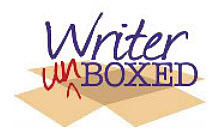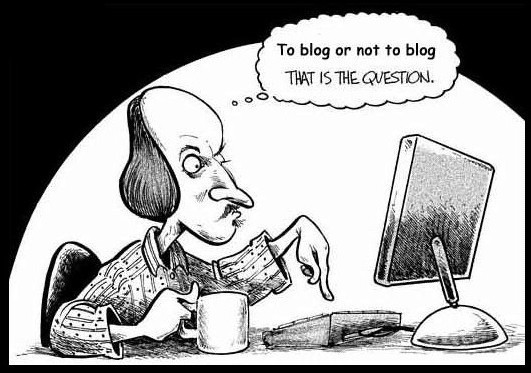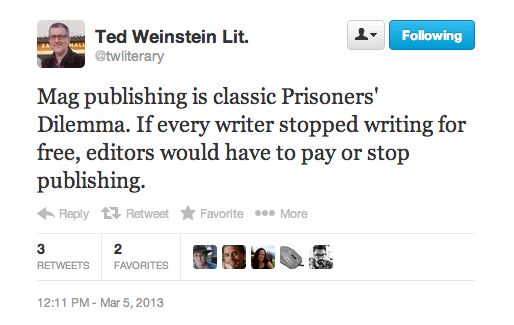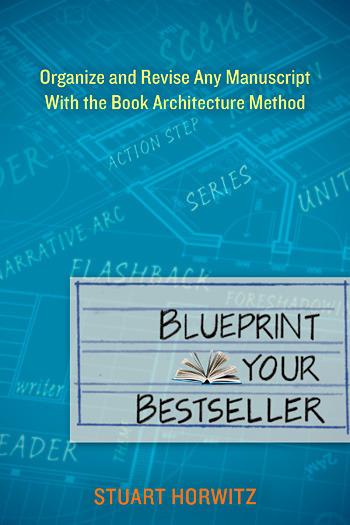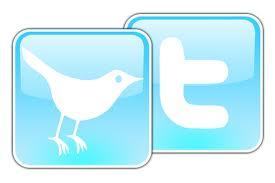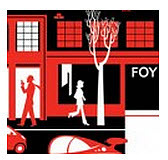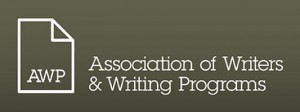Jane Friedman's Blog: Jane Friedman, page 179
March 19, 2013
Your Story Opening: Shock vs. Seduction
Today’s post is excerpted from Fine-Tuning Fiction by award-winning novelist Chelsea Quinn Yarbro.
Every story moves at its own pace, or the speed at which the narrative advances. Generally, stories tend to pick up speed as they near the end, although you’ll find exceptions when they slow down, such as Shakespeare’s Othello, which draws out the suspense and leaves a sense of foreboding that sets up the last scene.
So how fast is fast enough? There is no formulaic answer to that question. Each story will reveal its internal rhythm if you take the time to work the story through in notes before getting down to actual writing. Just as in music, contrasting rhythms make for more interesting listening, so in storytelling, shifts in pacing can lead to a more compelling narration. It needn’t be worked out as in a musical score, but being aware of different speeds in story development can add to the strength of the work. This preliminary effort—for some writers, the first draft, for others, the developmental notes—may take a while to complete, but once it is done, the story will be more easily written than if you do not think it through first.
Not all characters want to move at the same pace, and the push-pull conflicts of the characters can be incorporated into the suspense of the story, whether it is the townspeople urging a reluctant sheriff to put on his guns again, or an eager suitor trying to infuse his/her paramour with equal passion. The balance of advance and retreat can make a story more interesting than when there is uniformity of purpose.
Because antagonists move first, they may push the narrative along for the first half of the story, but as the protagonist rises to the occasion and takes up the response, he/she may also take over the pacing of the story, and push the story along to the crisis. Usually the antagonist initiates the last rush to the climax. There are exceptions to these dicta, but they are just that—exceptions. Even in first-person narrations, the pacing will tend to follow this pattern, no matter who is telling the story.
A reader is drawn into a story in one of two ways: shocked or seduced. This is called the hook, and it must be in the first three paragraphs of the text, preferably in the first sentence. The hook also sets up the initial pace of the story, which is maintained through the beginning of the tale.
Private Hammond staggered as the bullet ripped into his leg.
That is a shock hook. The character is caught up in an action that demands all his immediate attention, with implied ramifications of immediate significance to the character. The reader is grabbed abruptly, alarmed by the event. By giving the wounded character a rank, a military setting is implied, and the assumption of some kind of formal conflict is assumed and will be part of the reader’s expectations unless quickly disabused of them—such as this being a failed training exercise. If Eric is substituted for Private, the possibilities become broader and more equivocal. In either case, the reader is immediately involved in a risky situation, which demands prompt response of some kind.
Clouds were massing at the horizon, piling up into towers where lightening skidded amid coiling winds.
That is a seduction hook, a riskier hook because it eases the reader into the story rather than shoves, and any misstep can give the reader the means to back out of the story. Implication of what’s to come is essential to a seduction hook.
Sometimes first paragraphs are used as a kind of opening argument in the legal sense, which rarely works either as a shock or a seduction hook, unless the story really does begin with an opening argument, in which case it would function as a seduction hook. Pulling off a really strong seduction hook is a major accomplishment, and one that can be overdone. But when used judiciously and appropriately, seduction hooks can be stronger than shocks. In the example above, the implication of an approaching storm draws the reader in, for it also implies impending trouble. The next sentence should introduce a character or two to notice the gathering storm, or the lack of characters must be in some way significant, or the reader will be able to back out of the story, which is the one thing you do not want. You may offer the storm as a primary problem—an inhuman antagonist—or you may offer it as punctuation to other action, a complication that will either underscore or intervene in on-going events.
Here are a couple examples of second sentences to help sink the seduction hook:
Granny Lawrence pointed her arthritic finger at the sky, muttering that there would be flooding before midnight—she could feel it in her bones.
From his position in the traffic helicopter, Brad Mayfield warned his producer at WRDO that St. Charles County should be on twister alert.
The men trudging back from the fire-line watched the sky uneasily, wanting rain to put out the last of the forty-three acre blaze, but wary of more strikes that would ignite new fires.
The pace on the third example is the slowest, but it is also setting up two possibilities instead of one, as the first two do; the possibilities of the third example require more explication, particularly if they are being set up to create equivocation. Ambiguity can be useful in a seduction hook, but it is also trickier to maintain.
There was something moving beyond the screen of trees, something that cast a shadow that went halfway up the trunks, something that groaned as it went.
This ambiguous opening is designed to give a sense of uneasiness, not as abrupt as the shock opening, yet it is more upsetting than a standard seduction opening. This works better for long fiction rather than short. By presenting a number of possibilities, you set the reader to speculating, and that becomes the seduction, for anything the reader imagines is worse than anything you can describe, unless you and the reader share the same fears.
Beginning a story too rapidly can leave you with nowhere to go as the action begins to build. However, most stories have fairly brisk beginnings, not only because it will tend to hold the reader’s interest more readily, but because it makes it easier to delineate the argument of the story and keep the reader turning the pages.
Getting the story going can be the most ticklish part of storytelling because not all tales lend themselves to fast starts, and when the story requires a slower start, the implications of this less dramatic beginning must be engrossing so that the reader is held by the possibilities inherent in the situation. So long as the internal rhythm does not flag, a beginning in an extended story may take up to a third of the length of the tale without affecting the pacing adversely, provided that the slow opening is devoted in large part to defining characters and the implications of more going on than is readily apparent. Short stories on the other hand usually have abbreviated beginnings; the pace begins to build directly to the climax from page one, paragraph one, line one.
In telling a story, it is tempting to try to force the speed of the action in the hope that this will compensate for problems in the story; this serves neither nor the story well. While it is true that some writers have succeeded in achieving this literary Doppler Effect, it is at best a cheat and at worst a betrayal of the story. If you have to rush through a story to make it seem convincing, you have probably not thought the story through, and need to do so before continuing with it.
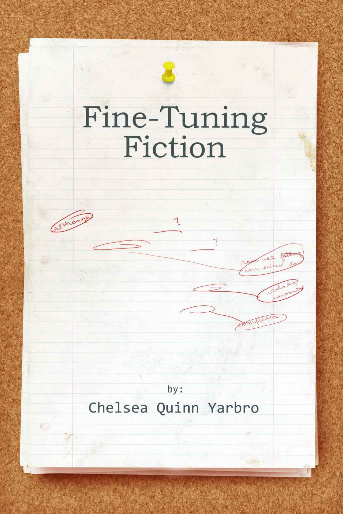 If you enjoyed this post, I highly recommend reading more from Fine-Tuning Fiction by Chelsea Quinn Yarbro.
Fine-Tuning Fiction began as a two-part writing seminar, each five hours long, at the Writers Connection in Cupertino, California. This book is the result, and it combines the lecture and the lab portions of both seminars.
If you enjoyed this post, I highly recommend reading more from Fine-Tuning Fiction by Chelsea Quinn Yarbro.
Fine-Tuning Fiction began as a two-part writing seminar, each five hours long, at the Writers Connection in Cupertino, California. This book is the result, and it combines the lecture and the lab portions of both seminars.
The post Your Story Opening: Shock vs. Seduction appeared first on Jane Friedman.
March 18, 2013
5 Publishing Industry Trends for Writers to Watch
Today I’m a guest at Writer Unboxed, where I discuss five publishing trends that writers should keep an eye on. Here’s a brief excerpt related to contracts:
By the time I left trade publishing (2010), the contracts were being tweaked every 6 months to reflect a changing business environment and new opportunities in digital publishing. I’m starting to wonder if there will ever be a “typical” contract again, given the increasing number of variables. Consider:
The increasing leverage of successful self-published authors (see Hugh Howey and his traditional publishing deal that allow him to keep his e-book rights).
New digital imprints or start-ups that offer very different contracts than established outlets—and rightly so, though some are good contracts and others are bad, more on that below.
Print publishing deals and distribution rights are becoming more and more like subsidiary rights. In other words, they’re not always the most important or profitable right for an author to license.
Foreign and translation rights will become increasingly important as e-book sales grow in international markets.
Unfortunately, most publishing contracts are closely guarded and not available for public review. So what is an author to do? Here’s my advice.
Visit Writer Unboxed to keep reading.
The post 5 Publishing Industry Trends for Writers to Watch appeared first on Jane Friedman.
March 15, 2013
It’s Time for (Many) Experienced Writers to Stop Blogging
Note from Jane: Today’s provocative guest post is by L.L. Barkat (@llbarkat). If this topic interests you, I also recommend reading my older posts, Please Don’t Blog Your Book: 4 Reasons Why and Get Started Guide: Blogging for Writers, especially if you think blogging is the right choice for you. While my views don’t mirror Barkat’s (see the comments for my take), her perspective is refreshing and helps to dispel a few platform-building myths that are pervasive in the writing community. Blogging is neither a requirement nor the best marketing and promotion tool for a huge swath of writers, regardless of their experience or level of accomplishment.
I look forward to a lively debate—offer your view in the comments.
“Blogging is a waste of time.”
The panel burst into protestations. Jana Riess, Lauren Winner, Cindy Crosby, and Andy Crouch were at the Calvin Festival, discussing social media in 2006, before it was a foregone conclusion that if you were an author you should have a blog.
Andy Crouch was being a bit bald-faced in making his proclamation. After all, he wasn’t a blogger. He didn’t have much of a social media presence. Remember, these were the days before Twitter, super-charged Facebook, and LinkedIn. And forget about an author claiming to be the Mayor of the Library of Congress in a game of Foursquare. What’s more, nobody was going to pin Crouch’s statement on Pinterest or pheed it to Pheed.
Was Crouch right?
I decided to find out. Especially because I’d recently met the Director of Marketing and Promotion from Simon & Schuster, who’d told me flatly, “We ask all our authors to start blogs.”
So in 2006, I started blogging. Over six years, I wrote more than 1,300 blog posts, garnered over 250,000 page views, helped establish a large blogging network for which I later became the Managing Editor, test-marketed five books and wrote and sold them. I watched blogging colleagues get book contracts. I hired some of these bloggers as editors for the network where I managed. I was a true believer in the blog world.
But on Saturday, November 10, 2012, I suddenly did the unthinkable. I myself stopped blogging.
I had finally decided that Andy Crouch was right. Six years later.
Last spring, an author approached me via Twitter to get my advice about blogging. How could she make it work for her? Was it worth it? Should she move to WordPress, get a new design? What did I think?
I told her to forget about blogging. And one week later, after a Skype conversation about writing and platform-building, I hired her as an Editor for Every Day Poems, a publication of the site where I currently serve as Managing Editor. “How many people are visiting your blog per month? One hundred?” I had joked gently. “Work with us and serve a much larger audience. This will be more worth your time.”
Does this mean I would recommend that everyone stop blogging? No. I encourage new bloggers, just the way I always have. It’s an excellent way to find expression, discipline, and experience. But if writers already have experience, and they are authors trying to promote themselves and their work, I tell them to steer clear. If they’ve already found themselves sucked into the blogging vortex, I suggest they might want to give it up and begin writing for larger platforms that don’t require reciprocity (an exhausting aspect to blogging and a big drain on the writer’s energy and time).
Someone will disagree with me and point to a case like best-selling author Ann Voskamp, and I will point them back to the facts. Yes, Voskamp made it big largely because of the power of her blogging platform, but she had the power of being first. Before blogging was a “thing,” Voskamp was already blogging quietly and steadily in 2003. Before blog networks came of age, she was writing for one of the few women’s sites that also had the power of being first. Time cannot be turned back. Few authors can make of themselves what Voskamp did—not for lack of talent but for lack of timing and sheer cyber-longevity.
If an author shouldn’t be blogging, what should an author be doing? This is up for discussion. It is a current trend to use Facebook as a writing venue. One of my top colleagues just got invited to write for 99U, as a result of her Facebook-writing activity. This same colleague connected with Lifehacker via Twitter and got a regular writing gig as a result. And she is not a writer with an otherwise large platform. As it turns out, intelligence can be expressed in strings of 140 characters, and big outlets will pay attention.
For myself, the same has been true. New writing assignments, some even international, have come primarily through Twitter. Likewise, I myself publish poets I meet on Twitter and Tumblr, while I am far less likely to do the same for bloggers. It’s not a bias. It’s a matter of simplicity. I can see at a glance how a writer expresses. Remember the old elevator pitch? It’s alive and well on Twitter and I depend on it. Apparently others do too.
Is blogging a waste of time? Crouch was ahead of his time in saying so. For the experienced writer, my answer is yes … in 2013.
The post It’s Time for (Many) Experienced Writers to Stop Blogging appeared first on Jane Friedman.
March 5, 2013
The State of Online Journalism Today: Controversial
On Tuesday, March 5, I found (via Twitter) the following piece by freelance journalist Nate Thayer:
A Day in the Life of a Freelance Journalist—2013
The post consists of an e-mail exchange between Thayer and an Atlantic editor, where Thayer is asked if he would repurpose a previously published piece for the Atlantic’s website. He is not offered any money, but is told he will gain exposure since Atlantic’s site enjoys 13 million readers per month.
For those familiar with the online world of publication, this exchange is hardly surprising or unusual. If you scan the posts at Who Pays Writers, you’ll see that $0 or maybe $50–$100 is common for very well-known sites. In fact, the more traffic a website gets, the more it can avoid payment by offering the carrot of exposure—which is indeed valuable and needed for some writers, but not all.
Thayer, in response to the offer of pay through exposure, says:
Frankly, I will refrain from being insulted and am perplexed how one can expect to try to retain quality professional services without compensating for them. Let me know if you have perhaps mispoken [sic].
As indignant as Thayer might be, I find his perplexed state to be rather disingenuous if he’s been keeping up at all with the evolution of online journalism. One can imagine a brief “No, thank you,” would have been the more graceful gesture, but on the other hand, if writers don’t express outrage at not being paid—and don’t take editors to task for it—can they really expect the situation to change? (Personally, I still like and advocate for the brevity of the “No, thanks,” answer. If editors hear “no” often enough and can’t get their hands on the content they want or need, that spurs change, too.)
Thayer’s post spread quickly via Twitter on Tuesday, with Atlantic editor Alexis Madrigal (@alexismadrigal) coming to the defense of Atlantic Digital. However, Madrigal is NOT the editor who was involved in the e-mail exchange above; he works for a different “channel” of Atlantic Digital, but is one of the most prominent and (in my mind) admirable editors involved with the digital side of the Atlantic, which operates independently from the print side.
Madrigal offered fascinating insights into the editorial operations of Atlantic Digital, including:
Atlantic’s channel editors have tiny freelance budgets, but independently control how things come in, what rates are, what the “rules” are, etc. (Tweet.) If he had more money, Madrigal implied he’d be more likely to hire a staffer than freelancers. (Tweet.) He said that he used to run a lot of outside material, but it was hard to control quality, hard to edit, and time consuming. (Tweet.)
Staffers and established contributors write most of the stories at Atlantic Online. He said that 90% of the traffic comes from these sources, not freelancers. “The site is almost entirely driven by top 15 writers or so, all paid.” (Tweet.) He later said a typical Atlantic staffer brings in 400K uniques per month (not clear how many articles a staffer typically writes, however), and a good freelance piece will bring in a median of 15K-25K uniques. (Tweet.) Freelancer Paul Ford (@ftrain) responded, “Ah so now I can understand the gap between Thayer’s POV and Atlantic POV. Starts to make more sense.” (Tweet.)
Broadly speaking, the norms under discussion are up in the air and inconsistent within publications and across different publications. (Tweet.) Others in the Twitter stream argued this meant that it’s important for Atlantic to articulate a clear vision, and that varying philosophies within a publication are detrimental to that vision and ultimately to survival. However, Madrigal responded by saying that the alternative is “centralized control of what is happening,” which he wants to avoid. In other words, as the technology channel leader, he presumably gets to call the shots, and that’s been good for him and that channel. (Tweet.)
For my unschooled readers, I should emphasize that the decentralized nature of Atlantic Online is exactly the opposite of what happens at most traditional print publications, which often have a rigid hierarchy. Based on my experience and observations, the decentralized structure of Atlantic Online is a growing and common phenomenon among progressive, digital publications. (Another example of a big brand employing a decentralized strategy is Forbes.)
The tension of quality vs. velocity (or quantity) hasn’t disappeared. A particularly revealing moment came with the following: “This is a complex battle to win when biz dev has one lever to push: velocity. They can’t say, ‘Write better stuff.’” (Tweet.) However, Madrigal also mentioned that since 2010 they’ve ratcheted down the number of pieces getting pushed out because of the downside and risk of low-quality work. Ultimately, he says they have to do both “fast” and “slow” work well. (Tweet.) And it’s exhausting. (Tweet.)
The discussion started to come to a close with these two tweets about the state of online journalism, which Madrigal argued was tough, but not depressing.
@clairecm Dozens of journalists working at The A are also “the state of online journalism today”
— Alexis C. Madrigal (@alexismadrigal) March 5, 2013
If you’re a mag writer getting your start now, you’re more likely to get a staff job, less likely to freelance. (Both paths still tough.)
— Alexis C. Madrigal (@alexismadrigal) March 5, 2013
UPDATE (Tuesday, 4 p.m.): The Atlantic has posted an official statement on the matter, from James Bennett, editor in chief.
My thoughts so far:
From the perspective of the writer: If a piece of my work were solicited for The Atlantic, and I were offered no payment—just exposure—I’d take it. At this stage of my career, it’s an attractive offer if the material is already written. Was it a good deal for Nate Thayer? Based on his career profile, it’s easy to see why he said no. Every writer can make a different decision and still have it be the right decision.
From my perspective as VQR web editor: (1) I have been taken to task on Twitter (at least indirectly) for VQR’s payment for online work, which is $100 per post. A freelance journalist told VQR (on Twitter) that pay rate is insulting. For an original, in-depth reported piece, I agree. However, $100 is not a one-size-fits-all pay rate. It varies from writer to writer and piece to piece. (2) Strong online writers, with something unique or meaningful to say—who also drive traffic—are not easy to get. They are in high demand. And I would pay well for their work if they came to me, but they are not (even when solicited). I believe that is because VQR doesn’t offer sufficient exposure, plus our site is cutting edge only if you’re an online writer from 2004. So writers: Don’t tell me exposure or platform doesn’t matter. I know it does—just like relationships and networking matter. (3) VQR is still print-driven, at least to the extent that it probably shouldn’t even have a full-time web editor position. Nine months in, I have barely begun to solve the dilemma of what our online content strategy ought to be given the limited resources we have (both time and money), but I can already see that continually sourcing freelance content for online is not optimal, possibly detrimental.
From the perspective of a publications leader (who once provided a vision for a brand): I hope there can be a compromise, somehow, between having a decentralized structure for Atlantic Online, but still having some brand consistency or philosophy in how content is sourced and pushed out. Must these two things be mutually exclusive? My idealistic side wants to say no—unless the various channels at Atlantic are SO different from one another that they absolutely must work under different business models. But I doubt this is the case?
From the perspective of someone who has long worked in publishing: I know few people, if any, who go into publishing (or journalism) for great pay. It’s usually about love, passion, a particular set of values, and the resolve to do something that’s very hard, not well paid, but ultimately rewarding in other ways. Some writers have chosen the freelance game, the same way others have chosen to work on the inside, for a regular paycheck, and (again, expressing my idealism), I believe there’s a shared set of goals. It’s far more productive to work together than to launch full-scale attacks, but that’s not to say we should hold back on constructive criticism or an idea exchange of how things can work better. For-profit publications that are (on the whole) ethical, transparent, and respected probably have the hardest time of all finding a sustainable business model. What do we gain by trashing them?
This is a complex and controversial issue, something that we discuss every week at my UVA class in digital media and publishing. I welcome discussion and comments below, but let’s avoid black-and-white declarations or finger pointing. I’d love to hear about particular online publications, websites, or outlets that you think are getting it RIGHT.
For more on this issue
To see the range of Twitter reactions & other discussions, visit Mediagazer for an aggregation.
The Problem With Online Journalism by Felix Salmon offers an excellent analysis. He writes: “The Atlantic magazine only comes out ten times per year, which means it publishes roughly as many articles in one year as the Atlantic’s digital operations publish in a week. When the volume of pieces being published goes up by a factor of 50, the amount paid per piece is going to have to go down” … and … “At a high-velocity shop like Atlantic Digital, freelancers just slow things down—as well as producing all manner of back-end headaches surrounding invoicing and the like. The result is that Atlantic Digital’s freelancer budget is minuscule.”
The post The State of Online Journalism Today: Controversial appeared first on Jane Friedman.
The Pros and Cons of Being Agreeable and Saying Yes
As writers, we must often protect our time so that we can get our most important writing done. On the other hand, being agreeable and saying “yes” more often can lead to meaningful opportunities—even publication.
Author Matthew Salesses (@salesses) discusses the pros can cons of being agreeable in the latest Glimmer Train bulletin:
Being open to opportunities, and saying yes to those requests, is part of participating in the literary community, I think. My novel would not have existed without that community. It is a book written-on-demand. I am lucky to have been asked, but I remind myself that it was up to me to say, “yes.”
Read Matthew’s entire essay “Being Open to Opportunities.”
Also, don’t miss these other essays on writing in the newest bulletin from Glimmer Train:
Literary Fabric by Vi Khi Nao
On Revision by William Luvaas
The post The Pros and Cons of Being Agreeable and Saying Yes appeared first on Jane Friedman.
March 4, 2013
If You Struggle With Plot, Here’s How to Think About It Differently

Flickr / Eole
Today’s guest post is by Stuart Horwitz, author of Blueprint Your Bestseller. Find him on Twitter at @Book _Arch.
One thing I hear from writers a lot is, “My work has always been more character-driven, which I think is why I struggle with plot.”
I’m not sure what character-driven means in this context. Does it mean that their work is more about what people think and feel than about the things that happen? Maybe. But it may also simply mean, “I like to write really messy first drafts, and the only way I can find my way through the material at all is by identifying with a character or two.”
But guess what: First drafts are supposed to be a mess! And the notion of “plot” is a misconception that leads too many writers to get confused and focus on all the wrong things. In fact, the best way to produce a first draft is to produce a large pile of pages and avoid trying to organize anything at all. At first.
Upon hearing this, writers may ask, “How do I know when I’ve finished my first draft?” In a sense, first drafts are never finished; where you stopped writing is the end of the first draft. Then it’s time to step back and see what you’ve got. And the way I recommend doing this is by using the unfamiliar, plot-free concept of series.
What is this series I speak of?
A series is the repetition and variation of a narrative element within a story, the process of improvement or deterioration which creates the narrative arc.
The repetitions and variations of an object, for example, is what creates a symbol. A series can also be seen in the repetitions and variations of a person (or if you prefer, their identity and change), which is what creates a character.
Series is how a repeated phrase becomes the work’s philosophy and how a particular setting takes on significance. In short, everything that repeats and varies in your work is a series. But unlike the word “plot”—which basically means everything that seems to be important, all at once—you can work with a series. Once you begin looking, you’ll probably find that there are 10-15 series in your work if you are writing a book-length piece of fiction or nonfiction. When you find them, you can work with them individually first, which makes life much simpler.
Imagine just working with one series at a time. Let’s say you want to introduce 9/11 into your narrative. “Tricky! Overdone!” shouts the voice of the critic. “That must have been so awful for you,” says the voice of a sympathetic cheerleader. But neither of these approaches are particularly helpful. “Let’s wait and see,” says a neutral audience member. “Let’s see how 9/11 is used before we pass any judgment.” And that’s the real key, how something is used, not what it is in the abstract.
The first time you introduce 9/11 is the first iteration in that series. Your readers won’t even really notice it. The first iteration is like planting a seed. You’ve probably heard of the Chekhov saying, “A gun in the first act must go off in the third.” Well, this is the first act.
The second time you mention 9/11 your readers will be more keyed in. They will want to see what is different about the reference to 9/11 this time. That is the second iteration. In this and all following iterations you will want to either change the context and/or the content of how and when you bring up 9/11; that change is how emotion is generated in a narrative.
Thinking about one series at a time can be very helpful when you want to time your iterations as well. If, for example, you mention 9/11 on page 7 and on page 17, and then not again until page 297, you will have created a certain suspense by its absence. Was that your intent or did you just miss an iteration?
Series can also help with beginnings, middles, and ends. My guess is that this series we are discussing (9/11: present on pages 7, 17, and 297) is missing a middle. The “suspense” that has been created is probably because we forgot to fill in several blanks.
Now comes the best part. When you have a bunch of your series relatively clear in your mind, you can lay them out like individual strands of rope. You can entwine them in development, knot them together in conflict, thereby creating a net which ensures the overall work has unity. If you want to call that a plot, go ahead. But plots are awful to write. Like in the human body, the blood, muscle, and tissue all develop before the bone.
If you enjoyed this post, then I encourage you to check out Stuart Horwitz’s newest release, Blueprint Your Bestseller. Click here to view it on Amazon or download a sample to your Kindle.
The post If You Struggle With Plot, Here’s How to Think About It Differently appeared first on Jane Friedman.
March 2, 2013
Best Business Advice for Writers: February 2013
Best Business Advice for Writers is a monthly link round-up where I share the best online articles focused on the business of writing and publishing. Share any best reads you’ve found lately in the comments.
Second-Class Contracts: Deal Terms at Random House’s Hydra Imprint by Victoria Strauss (@victoriastrauss)
New York-based corporate publishers are launching digital-only imprints with unattractive contract terms: no advance, editorial/design costs are applied against your net earnings, and a 10% marketing/promotion fee is applied against earnings as well. Strauss comments:
If Random House indeed intends to reach out to self-publishers with these new imprints, it may want to re-think its contract terms. It’s hard for me to imagine even moderately successful self-publishers finding a deal like this attractive.
I agree. I’m not sure what value Random House is really providing here, except their brand name and a method for authors to get professional assistance that they ultimately pay for out of pocket. Read the full article at Writer Beware.
What Makes for a Good Book Event? by Togather (@togatherinc)
This interview with Tumblr’s Rachel Fershleiser discusses how to do a meaningful and fun book event. Fershleiser says:
I think there’s still this ridiculous cliché that book events are one author standing at a podium, droning on and on, and in my experience that’s largely untrue. But maybe I just go to good events? You know, ultimately people are coming out for a night of entertainment, they’re not coming out to be sold to; they’re not even really coming out to learn. For the most part they’re going out to have a fun and interesting time, and so I always think there should be more than one voice.
Read the full interview at Togather’s Tumblr.
On Getting Paid and Knowing What You’re Worth by Virginia Sole-Smith (@V_Solesmith)
If you’re new to the freelance life, then you should read what eventually becomes, after a brief rant, a practical post about setting rates and knowing when to work for free. One tip she offers:
[Write for free] if the assignment is a personal essay or fiction. This kind of writing is very difficult to assess from a query letter so it’s standard practice for editors to ask to see the whole draft on spec. You have to do the work upfront, then get paid — or if they reject it, take that work on to the next potential client.
She also has some excellent advice on the content mills. Click here to read the full article at Medium.
Sorry, the Short Story Boom Is Bogus by Laura Miller (@magiciansbook)
Rumor has it that the short story is going to make a comeback, in part because of new technology. (The theory goes that all those people killing time at the doctor’s office will start reading short fiction on their smartphones and tablets.) Miller debunks the rumor, hard:
The idea that today’s time-strapped and mentally scattered readers will find short stories more congenial is far from new; I remember hearing variations on this plaintive theme from authors, editors and publishers since before the rise of the Internet. Yet there is little to suggest that it is any truer now than it was, say, when we started Salon in 1995. In fact, a survey of Amazon, New York Times and USA Today best-seller lists suggests that most readers crave ever longer and more complex fictional narratives, such as George R.R Martin’s mammoth fantasy series (the basis for HBO’s “Game of Thrones”) or the “Fifty Shades” trilogy, in which one couple’s kinky courtship is drawn out over a preposterous three volumes.
Read the full article at Salon.
How E-Book Readers Shop and the Importance of Sampling by Joanna Penn (@thecreativepenn)
If you’re planning to e-publish, or already do, make sure you’re offering free samples. In one of her tips, Penn writes:
Get into the meat as soon as possible. Put all the acknowledgements and extra stuff at the back, not within the sample. I was severely annoyed recently to download an Angela Carter anthology of short stories to find that the entire sample was an essay about her work and the stories didn’t come until later. I looked for a better version.
Read the full article at The Creative Penn.
Does Social Media Sell Books? Gillian Flynn’s Agent Gives Her Perspective by Fauzia Burke (@FSBAssociates)
The answer is: it depends. Flynn’s agent tells Burke:
It’s important for authors to leave no stone unturned and consider how social media can work for them, but also important to consider the whole picture of getting the word out about their book and reaching readers. I’m sure there are examples of authors whose success is directly related to their social media strategy/efforts. But there are also authors whose success has come mostly without that. Without diving too deeply into it, I think there are different kinds of readers out there who use and don’t use social media indifferent ways — when there’s a match between the author’s efforts and the potential readers they are reaching, that can be magic. But when there isn’t, a lot of energy can go to waste. Not to mention that things are always changing in the social media world.
Read the full interview at FSB Associates blog.
Book Design Quick Tips for Self-Publishers by Joel Friedlander (@JFbookman)
As usual, Joel offers practical and straightforward do’s and don’ts about designing and formatting your book. Click here to read the article at The Book Designer.
Who Really Owns Your Photos in Social Media? (Updated 2013 Edition) by Kathy E. Gill (@kegill)
I get LOTS of questions from writers about permissions, copyright, and fair use. It’s a topic that writers need to be better educated on. Here’s one article that’s a must-read whether you’re seeking to use someone else’s photos, or uploading photos to social media sites.
Half of Amazon Book Sales Are Planned Purchases by Suw Charman-Anderson (@suw)
Based on that title, you may be thinking, so what? It makes a difference because it affects an author’s marketing and promotion strategy. Charman-Anderson writes:
Self-published authors have limited resources for promotion and these figures show that you should focus not on trying to woo Amazon’s algorithm, but on building awareness outside of Amazon. Rather than hoping to gain traction within that 10 percent of people who pay attention to Amazon’s recommendations, or trying to crowbar your title into bestseller or top 100 lists, you should be focusing on building an independent fan base. No one can search for your books if they don’t know you exist.
However, there are people who disagree strongly with this conclusion. To find out why, read the comment thread on this article, PLUS read the extensive discussion right here on this site.
Don’t Quit Your Day Job: Traditional Publishing by the Numbers by Michael J. Sullivan (@amazingstories0)
An excellent primer on how the money works in a traditional publishing deal, if you didn’t already know. Sullivan writes:
When it comes to trying to determine advances for debut fantasy and science fiction novels Tobias Buckell is the best source I’ve come across, and his data seems to stand the test of time. His first author survey contained data from 78 authors and his second one included 108. He concluded that for debut authors you can expect:
For fantasy a median advance was $5,000 with an average of $6,494
For science fiction the median advance was $5,000 with an average of $7,000
58% sold with an agent and 42% without
Agented advances had a median of $6,000 (average of $7,500) and unagented came in at $3,500 (average of $4,051)
Read the full article at Amazing Stories.
What Writers Need to Know About Goodreads by Jason Boog (@jasonboog)
Now that the New York Times has profiled Goodreads, writers are more curious than ever about how to use the site effectively. Boog rounds up some of the most effective advice from other authors, including Michael J. Sullivan (also referenced above), who says:
The most important thing to remember about Goodreads is that members of this site REALLY hate self-promotion. Primarily because too many authors come to the site and do drive-by posts and leave. This makes their radar on such matters very sensitive. The key to goodreads is to become a member of the community first … and mention your writing only in context and when appropriate.”
Get the full scoop at Galleycat.
Did Amazon Just Kill a Golden Goose? by George Burke (@geoburke)
Amazon has instituted new rules regarding affiliate commissions that indicate they want to curtail aggressive marketing of free e-boks. Burke writes:
Is it possible that Amazon isn’t trying to save a few bucks on commission payouts, but rather is taking action against a trend of free books cannibalizing paid books?
Over the last year, incremental changes have been made to Amazon’s KDP Select policy. The “Great Algorithm Change” of March 2012 reduced the ranking and recommendations of free Kindle books to be a tenth of that of paid books, likely to minimize the number of free books that were automatically recommended to readers on product pages. Then Amazon began hiding the Top 100 Free Kindle Bestsellers list behind a separate tab on category pages.
… Amazon may be actively trying to squash the availability to readers of free books.
This is an interesting article not for the potential impact on affiliate marketers, but for the strategy that Amazon is now implementing, and what that might reveal about their overall business. Read the full article at Publishing Perspectives.
The post Best Business Advice for Writers: February 2013 appeared first on Jane Friedman.
March 1, 2013
What Has Changed About the Writing Community Since the 1990s?
I’ve been working in publishing since the 1990s, during my college years. (A bit of trivia few people know: one of my first jobs was data entry for a directory of men who served on the USS Indianapolis, by an Evansville, Indiana, based publisher.)
Over at The Write Stuff conference blog, I answer a few questions about the publishing industry today, and what I think has changed about the writing community since I got into the game. Here’s a bit of what I say:
The biggest change by far is the growing voice and footprint of the self-publishing and e-publishing community, and the associated explosion of services for the independent author. While some of these services are much needed and welcome, it’s difficult for a new writer, without a history of experience, to distinguish between a service that’s worth her time or money, and one that is not. When in doubt, look carefully at the background and qualifications of the people who provide the service, and avoid those that don’t clearly identify who you’re working with.
I also discuss:
How you can keep up with all the changes in the publishing industry without going crazy
How introverted authors can engage with readers in a meaningful way
How writers build platform and reach readers
Click here to read the full interview.
The post What Has Changed About the Writing Community Since the 1990s? appeared first on Jane Friedman.
February 19, 2013
How I Got a Six-Figure Twitter Following (and Why It Doesn’t Matter)
It’s almost a running joke. Whenever my manager introduces me at an event, he always starts by saying how many Twitter followers I have, which is inevitably far more than anyone else in the room. Today, my follower number is a little over 175,000, and it grows by a few hundred every week.
How did my Twitter following reach six figures?
I was an early adopter. I started my Twitter account (@JaneFriedman) on May 22, 2008.
I’m active. Except for the first 7-8 months of joining Twitter, I’ve been actively tweeting for more than four years.
I’m relentlessly focused. Mostly I tweet about writing, media, publishing, and technology.
I mostly share links that I hope are helpful or insightful.
I’m somewhat reserved. It’s rare for me to tweet more than 6-8 times per day. (My total number of tweets has not yet cracked 10,000.) The way I look at it: Each tweet is a potential waste of someone’s time.
I joined Twitter while I was publisher of Writer’s Digest, and I also created the Writer’s Digest Twitter account. Writer’s Digest now has about 370,000 followers, and for its first two years, I operated its account in tandem with mine. It was helpful to have my name associated with a big brand when I got started.
However, none of that probably matters as much as what comes next. Here’s a graph showing the history of my follower growth on Twitter:
One immediately wonders: What was I doing from summer 2010 through fall 2011—the part where the graph is stepping up? A few things:
I started blogging better (better headlines, better topics, better solutions for writers) and blogging more consistently. (This was during my years at There Are No Rules at Writer’s Digest.)
I ran a weekly blog feature called Best Tweets for Writers. I curated a few dozen of the best online articles (for writers) I’d found via Twitter. The series started around May 2009 and concluded in summer 2011, when I asked Porter Anderson to take the reins, and he created Writing on the Ether.
Also during this time I was actively live-tweeting conferences and other events, which usually results in a following boon.
My blog content reinforced what I was doing on Twitter, and what I was doing on Twitter reinforced the blog. I created a rather virtuous circle that I believe boosted the follower count. But most important, the Best Tweets round-up wasn’t about myself or my own content. It was about drawing attention to other excellent work, which resulted in a lot of mentions, links, tweets, and so on. Some call this link-baiting, and it’s a fairly well-known strategy for building blog traffic. If done well, everyone wins.
There was one thing out of my control, which I can’t track very well: At some point, I became one of Twitter’s “Suggested Users” in the Books category. If I’m still there, I believe my account is listed fairly close to the bottom. If I was being shown higher around 2010-2011, that could also be playing a significant role. But keep in mind, I probably would’ve never been listed if it weren’t for the activity I’ve just described.
Why the Size of My Twitter Following Doesn’t Matter
Some studies show that smaller, more loyal followings are more effective. Check out this ReadWriteWeb article from 2010: The Million Follower Fallacy: Audience Size Doesn’t Prove Influence on Twitter. That aside, here’s a big reason why no one needs to be impressed by my following:
[You can check your own stats for free by clicking here.]
What does this mean? That my following is more accurately stated as 71,750, after you weed out the fake and inactive accounts. Of those “good” accounts that follow me, how many do I actually engage? Klout notes that, in the past 90 days, I’ve had more than 2,000 mentions and 1,000 retweets. That’s probably a better reflection of how many I influence via Twitter.
And now you know not to be impressed by that 175,000 number.
The post How I Got a Six-Figure Twitter Following (and Why It Doesn’t Matter) appeared first on Jane Friedman.
February 14, 2013
WRITING ON THE ETHER: Flying Futurists
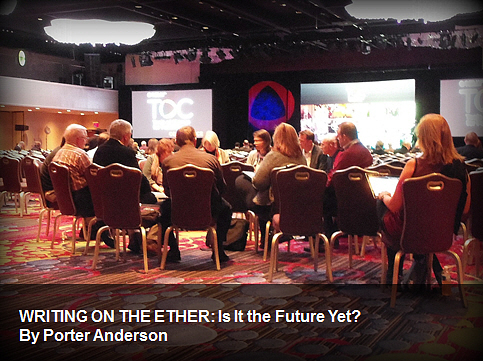
Table of Contents
Tools of Change 2013: Flying Futurists
Books: Reading on the Ether
Conferences of the Future
Tools of Change 2013: Flying Futurists
Look, up on the stage. It’s a bird. It’s a plane. It’s a futurist.
I like the image I’ve chosen for the lead here today on the Ether because that small circle of associates is an impromptu, off-schedule gathering. It’s a ring of a dozen or so colleagues in a sea of 1,200 seats, maybe more, in the Broadway Ballroom complex at New York’s Marriott Marquis between major plenary sequences of keynotes at O’Reilly’s Tools of Change for Publishing Conference (TOC), ending today.
Note: Again today (Thursday, February 14), the keynotes are being streamed live by the incredible O’Reilly team, you can watch them free on the conference’s main page. They run today from 1:10pET / 1810 GMT to about 3pET / 2000 GMT.
I don’t quite scoff at the heavy emphasis we have on “community” these days, but I come close at times. I’m very solitary by nature, I think many writers are.
I’m not always sure that this drive for community isn’t a dodge, a socially endorsed way to avoid doing the lonely work of writing. I tease Dan Blank mercilessly for promoting all this “sharing” everyone is supposed to do so eagerly, and most experiences of community make me less, not more, communal.
Voice, connection & relationships matter. RT @: You can not compete on the internet with just content. #TOCcon @
[image error]about 4 hours ago via HootSuiteReplyRetweetFavorite
Dan Blank
But the urge to band together during the disruption, displacement, dyspepsia, and disarray of the digital dynamic is certainly something others feel. And this small group in that cavern of a room struck me as emblematic of the trend.
O’Reilly Media and Tools of Change founder Tim O’Reilly said in his own, brief and stimulating keynote on Wednesday that we’ve become less afraid of the future. I hope he’s right.
I found myself wishing the future-ish keynotes at the end of the day had been longer. Giving Evan Williams five minutes to demo his latest, Medium, amid a fast parade of talkers kept everybody onstage jogging and most of us in our seats dizzy.
VC doesn’t invest MORE in publishing related startups because the sector doesn’t invest in them. #Toccon @
[image error]about 4 hours ago via TwitterrificReplyRetweetFavorite
Virginie Clayssen
But when it was possible to follow the fast-bouncing ball, you could her some very cogent comments from author and futurist Douglas Rushkoff—who gave us Cyberia when we thought it was a fad.
From Rushkoff’s fly-by keynote:
Digital is as different from the mechanical-age book as the book is different from the scroll…Before text, we had oral history, but you could always change that. With text we got accountability.
Wikert doing an admirable job of stopping this session being just a Qbend ad – and drawing out some wider takeaways #noteasy #toccon
[image error]about 4 hours ago via TweetDeckReplyRetweetFavorite
Sheila Bounford
And one of the themes running through this community-cheering conference is text. As in not going away. As spacey as things may be getting, it seems, we’re hearing a lot of folks on various stages talk “about the words” and about it all being “about the words.”
They don’t mention the accountability part as frequently. A mere oversight, I’m sure.
Gotta say, I’ve seen about 25 speakers over the last 2 days and only 3 of them were women. #toccon
[image error]about 20 hours ago via Twitter for iPadReplyRetweetFavorite
Zoe Dattner
But because we’re still in mid-conference as I write this, I’m going to take the unusual step of shortening the Ether this week. I’d like to see some more work done on what we’re seeing and hearing—in articles by our colleagues, I mean—before jumping to too many conclusions for which I should be held accountable.
TOC is nothing if not overwhelming each year, and for the best reasons. Joe Wikert and Kat Meyer have outdone themselves this year, starting with our superb first outing of Author (R)evolution Day with co-chair Kristen McLean of WriterCube and keeping up a torrid pace—those flying futurists!—right through the week.
“3 types of book: meal, machine, metaphor” Nix #toccon
[image error]about 4 hours ago via Twitter for iPadReplyRetweetFavorite
Michael Kowalski
I have a separate Extra Ether for you on “#ARDay,” as we hashed it: A Good Day for the (R)evolution. I’m really proud of that event, as I told Wikert at breakfast yesterday. Really proud, and very grateful to all who came, followed from afar, and, especially, those who spoke.
And here’s a piece on Bowker’s rollout of a new author service that combines the acquisition of ISBNs for your books with a format-conversion capability, in case you’re shopping for such: Bowker’s 1-Stop eBook Conversion Service
And now a shout-down to the DOJ from the ABA. #TOCcon
[image error]about 4 hours ago via HootSuiteReplyRetweetFavorite
Robert Weisberg
Here’s my piece on Sunday’s annual Book^2 Camp at Publishing Perspectives: Book Campground.
I’ve got an Epilogger running on our hashtags #TOCcon and #ARDay here. As I write this, it’s nearing 12,000 tweets and we still have this final day ahead of us.
As soon as we’re done, I’m on a flight to London for the Foyles Bookshop of the Future workshop Friday (the second of two such workshops they’re doing, hashtagged #futurefoyles).
So more to come. More text. More accountability, Mr. Rushkoff.
Click to comment
Back to Table of Contents
CNET coverage of our launch and first book! A startup takes on publishing #NextSteveJobs http://t.co/ySA4NM2N #TOCCON
[image error]about 5 hours ago via Tweet ButtonReplyRetweetFavorite
Net Minds
Books: Reading on the Ether/h1>
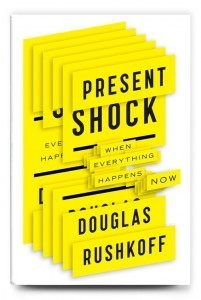 Of special interest this week, Douglas Rushkoff’s new Present Shock, about which he talked at Tools of Change this week.
Of special interest this week, Douglas Rushkoff’s new Present Shock, about which he talked at Tools of Change this week.
The book is, Rushkoff told us, “about the human reaction to living in a real-time…post-linear reality.”
And of ironic importance to authors: “We get into trouble when we choose the wrong forms. You shouldn’t sweat six months on a tweet.”
As each week, the books you see below have been referenced recently in Writing on the Ether, Ether for Authors, or in my tweets.
I’m bringing them together in one spot each week, to help you recall and locate them, not as an endorsement. And we lead our list weekly with our Writing on the Ether Sponsors, in gratitude for their support.
Writing on the Ether Sponsors
The Indie Author Revolution: An Insider’s Guide to Self-Publishing by Dara Beevas
Grow Your Audience: The Author Platform Starter Kit by Dan Blank
The Stars Fell Sideways by Cassandra Marshall
Handmade Memories: Poems and Essays, 1997-2011 by Guy LeCharles Gonzalez
Seasons in Love by Dave Malone
My Call to the Ring: A Memoir of a Girl Who Yearns to Box by Deirdre Gogarty with Darrelyn Saloom (Glasnevin)
My Memories of a Future Life by Roz Morris (Red Season)
Prophecy, An ARKANE Thriller by J.F. Penn (The Creative Penn)
The Prodigal Hour by Will Entrekin (Exciting Press)
Perfect Skin by Nick Earls (Exciting Press)
Rumors of Water: Thoughts on Creativity & Writing by L.L. Barkat (T.S. Poetry Press)
Watch for this: The New Intermediation in Publishing – http://t.co/a8ubZt39 #ARday #TOCCon @ @
[image error]about 5 hours ago via HootSuiteReplyRetweetFavorite
Steve Woodruff
APE: Author, Publisher, Entrepreneur by Guy Kawasaki and Shawn Welch
The Art of Being Not Governed: An Anarchist History of Upland Southeast Asia (Yale Agrarian Studies Series) by James C. Scott
Beside Myself by Jeff Gomez
Black Sheep by CJ Lyons
Buzz Books (free) from Publishers Lunch
Don’t Leave Me by James Scott Bell
Dreamlander by K.M. Weiland
Drinking Diaries: Women Serve Their Stories Straight Up by Caren Osten Gerszberg & Leah Odze Epstein
Exodus by J.F. Penn
The Fifth Assassin by Brad Meltzer
How Do I Decide? by Rachelle Gardner
Inspired: Eight Ways To Write Poems You Can Love by L.L. Barkat
Knot What It Seams by Elizabeth Craig
The Last Will of Moira Leahy by Therese Walsh
Nail Your Novel by Roz Morris
Notes From No Man’s Land: American Essays by Eula Bliss
Pentecost by J.F. Penn
Present Shock by Douglas Rushkoff
The Ring Road by Edward Weinman
Sell Your Book Like Wildfire by Rob Eagar
Sweet Tooth by Ian McEwan
Turning Pro by Steven Pressfield
Wool by Hugh Howey
Click to comment
Back to Table of Contents
Never metadata I didn’t like. #TOCcon #daythree
[image error]about 5 hours ago via Twitter for iPhoneReplyRetweetFavorite
Amy Stolls
Conferences of the Future
As usual, please let me know of conferences you’d like me to consider listing though my contact page. And for more about these, see my site’s page on publishing conferences.
| | |
https://twitter.com/ASKBURNIE/status/...
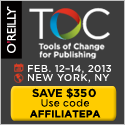 Last day today, February 14 New York City (again at Marriot Marquis Times Square) O’Reilly Media’s Tools of Change for Publishing Conference: “Every February, the publishing industry gathers at the O’Reilly Tools of Change for Publishing Conference (TOC) to explore the forces that are transforming publishing and focus on solutions to the most critical issues facing the publishing world. TOC sells out every year—don’t miss its potent mix of fabulous people and invaluable information.” Under the direction of Joe Wikert and Kat Meyer.
Last day today, February 14 New York City (again at Marriot Marquis Times Square) O’Reilly Media’s Tools of Change for Publishing Conference: “Every February, the publishing industry gathers at the O’Reilly Tools of Change for Publishing Conference (TOC) to explore the forces that are transforming publishing and focus on solutions to the most critical issues facing the publishing world. TOC sells out every year—don’t miss its potent mix of fabulous people and invaluable information.” Under the direction of Joe Wikert and Kat Meyer.
“How to Change the Future” off the cuff talk at #TOCcon about the future, SF, steampunk and meeting Pres. Clinton http://t.co/Tgde44KP
[image error]about 5 hours ago via webReplyRetweetFavorite
Brian David Johnson
February 11 and 15 London Foyles and The Bookseller Re-Imagine the Bookshop: In this invitational workshop, “Foyles has partnered with The Bookseller to invite customers and industry experts to help design a new flagship Foyles bookshop on Charing Cross Road for the 21st century with architects Lifschutz Davidson Sandilands…Participants will be asked to engage with issues such as declining physical book sales; the place of ebooks; the cultural importance of bookshops and author events; the specialist knowledge of booksellers; and how bookshops can provide customers with a place to buy books, however they decide to read them.”
May I give you New Yorkers some advice about celebrating this evening? STAY IN. V-Day is the biggest shitshow of the year for restaurants.
[image error]about 3 hours ago via webReplyRetweetFavorite
Ginger Clark
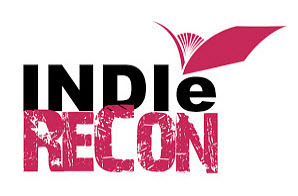 February 19-21 Indie ReCon online: “IndieReCon is a free, online conference…designed to help any writer or author who is curious about the ins and outs of indie publishing. You’ll find everything from the pros and cons of indie publishing, essential aspects in creating a high-quality book, successful online marketing, and expanding into international markets…We will feature more than 30 guests, including…Darcy Chan, CJ Lyons, Bob Mayer, Hugh Howey, M. Leighton, and Samantha Young.”
February 19-21 Indie ReCon online: “IndieReCon is a free, online conference…designed to help any writer or author who is curious about the ins and outs of indie publishing. You’ll find everything from the pros and cons of indie publishing, essential aspects in creating a high-quality book, successful online marketing, and expanding into international markets…We will feature more than 30 guests, including…Darcy Chan, CJ Lyons, Bob Mayer, Hugh Howey, M. Leighton, and Samantha Young.”
Teicher sounds like he’s testifying before a Congressional hearing. In 2001. #TOCcon
[image error]about 4 hours ago via Twitter for iPadReplyRetweetFavorite
Don Linn
March 6-9 Boston AWP, the Association of Writers and Writing Programs AWP last year drew 10,000 attendees to icy Chicago (it looked like 40,000 attendees when everybody’s coats were on), and, per its copy on the site this year, AWP “typically features 550 readings, lectures, panel discussions, and forums, as well as hundreds of book signings, receptions, dances, and informal gatherings.” The labyrinthine book fair is said to have featured some 600 exhibitors last year. The program is a service-organization event of campus departments, hence the many (many) readings by faculty members and a frequently less-than-industry-ready approach that worries some of us about real-world training the students may be missing.
De reden dat er zo weinig venture capital is in de boekensector is dat er te weinig innovatie in de branche is. #TOCcon
[image error]about 4 hours ago via Twitter for iPadReplyRetweetFavorite
ejbulthuis
April 5-7 New York City Writer’s Digest Conference East: Author James Scott Bell, who knows the value of coffee, gives the opening keynote address this year at “one of the most popular writing and publishing conference in the U.S. Writer’s Digest Conference 2013 is coming back to New York at the Sheraton New York Hotel. Whether you are developing an interest in the craft of writing, seeking an agent or editor and publisher for your work, or a veteran hoping to keep current on the latest and best insights into reaching a broader readership, Writer’s Digest Conference is the the best event of its kind on the East Coast.” (Note that this year’s hashtag is #WCE.)
#TOCcon “if #publishers don’t invest in #technology related to their industry, then financial community won’t either” ~Javier Celaya
[image error]about 4 hours ago via webReplyRetweetFavorite
Books I Love
April 17 New York CitypaidContent Live: Riding the Transformation of the Media industry Brisk and bracing, last year’s paidContent Live conference was efficient, engaging, and enlightening, not least for the chance to see many of the talented journalists of Om Malik’s GigaOM/paidContent team work onstage — Laura Hazard Owen, Mathew Ingram, Jeff John Roberts (in history’s most difficult interview), Robert Andrews, Ernie Sander, et al. Among speakers listed for this year’s busy day: Jonah Peretti, Jason Pontin, Chris Mohney, Erik Martin, David Karp, Mark Johnson, Aria Haghighi, Matt Galligan, Rachel Chou, Lewis D’Vorkin, John Borthwick, Andrew Sullivan, Jon Steinberg, Alan Rusbridger, Evan Ratliff, and, of course, the two people the law says absolutely must be in every publishing conference, Dominique Raccah and Michael Tamblyn.
@ I hope I’m Bruce Springsteen in that equation @
[image error]February 13, 2013 9:13 am via Twitter for iPhoneReplyRetweetFavorite
Kat Meyer
May 2-5 Oxford, Mississippi Oxford Creative Nonfiction Writers Conference & Workshops Susan Cushman follows her Memphis Creative Nonfiction confab with this year’s gathering at the shrine. Among faculty members: Neil White, Leigh Feldman, Lee Gutkind, Dinty W. Moore, Beth Ann Fennelly, Bob Guccione Jr. and Lee Martin. Pre-conference workshops or just the creature itself, your choice.
Publishers need to take on an entrepreneurial mindset #javiercelaya #toccon.
[image error]about 4 hours ago via Twitter for iPhoneReplyRetweetFavorite
Stephen Ingle
 May 3-5 Boston The Muse & the Marketplace 2013 is a production of Eve Bridburg’s fast-rising non-profit Grub Street program. It’s material reads tells us that organizers plan more than “110 craft and publishing sessions led by top-notch authors, editors, agents and publicists from around the country. The Manuscript Mart, the very popular and effective one-on-one manuscript reviews with agents and editors, will also span 3 days. We expect nearly 800 writers and publishing professionals to attend, while maintaining the conference’s wonderfully intimate, ‘grubby’ energy that we love.”
May 3-5 Boston The Muse & the Marketplace 2013 is a production of Eve Bridburg’s fast-rising non-profit Grub Street program. It’s material reads tells us that organizers plan more than “110 craft and publishing sessions led by top-notch authors, editors, agents and publicists from around the country. The Manuscript Mart, the very popular and effective one-on-one manuscript reviews with agents and editors, will also span 3 days. We expect nearly 800 writers and publishing professionals to attend, while maintaining the conference’s wonderfully intimate, ‘grubby’ energy that we love.”
Click to comment
Back to Table of Contents
Uh oh. Pilot & flight attendant just left the terminal with their suitcases. Dun dun dunnnn. #delta
[image error]about 4 hours ago via Twitter for AndroidReplyRetweetFavorite
Cory Doctorow
Main image: Porter Anderson
The post WRITING ON THE ETHER: Flying Futurists appeared first on Jane Friedman.
Jane Friedman
- Jane Friedman's profile
- 1882 followers


